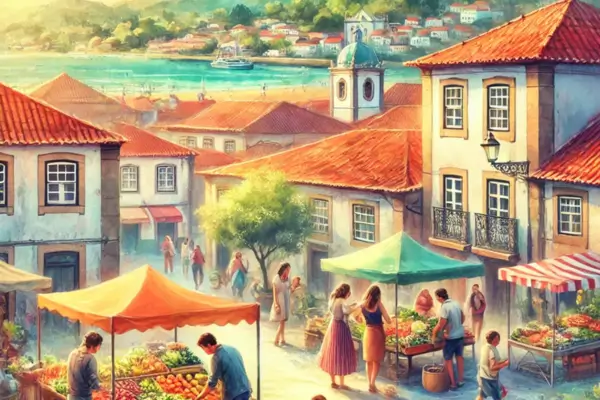Portugal has become a magnet for expat families seeking a fresh start in a place that balances affordability, safety, and exceptional quality of life. Known for its picturesque landscapes and welcoming locals, it’s no surprise that more families are trading the hustle of their home countries for Portugal’s slower, family-focused pace.
One of Portugal’s biggest draws is its strong sense of community, a lifeline for families looking to integrate. From friendly neighbors to bustling local events, the country’s close-knit culture offers opportunities to create a meaningful support network while enjoying the perks of a lower cost of living.
This guide is here to help your family not just settle but thrive in Portugal’s warm, tight-knit communities. Whether you’re exploring affordable homes in up-and-coming areas or navigating local customs, we’ll share tips to make your transition smooth and rewarding.
Why Community Matters for Expat Families
Moving to a new country is an exciting adventure, but it can also feel overwhelming, especially for families. Establishing a sense of belonging is crucial for both parents and children, as it builds mental well-being, stability, and helps ease the transition to a new culture. In Portugal, the tradition of inclusivity and close-knit community life makes it an ideal place to create those connections.
Building Connections for Mental Well-Being and Family Stability
- A Support System Away From Home: Moving abroad often means leaving behind extended family and familiar friends. Local connections can help fill that gap, offering support during tough times and celebrating milestones.
- Boosting Confidence: Engaging with others helps adults and children feel more confident in navigating a new environment. For kids, having playmates or classmates they trust can ease the adjustment to a new school or lifestyle.
Overcoming Homesickness Through Community Bonds
- Shared Experiences: Joining local groups or participating in community events allows expats to meet others who may be going through similar challenges, creating a sense of camaraderie.
- Daily Interactions Matter: Simple gestures like chatting with a shopkeeper, joining a local gym, or attending a neighborhood festival can transform feelings of isolation into a sense of belonging.
Portugal’s Tradition of Inclusivity and Warmth
- A Culture That Welcomes Families: Portuguese society places a strong emphasis on family values, and this extends to how communities welcome newcomers. Children are especially adored, which can make expat families feel immediately accepted.
- Neighborly Kindness: Whether it’s a neighbor offering fresh bread or someone helping translate a form, small acts of kindness are common in Portugal. These gestures can quickly build meaningful connections.
By understanding the value of community and actively participating in it, expat families can turn what might feel like an unfamiliar experience into a deeply enriching one. In Portugal, the warmth and openness of the people create the perfect foundation for families to grow and thrive.
Exploring Portugal’s Close-Knit Communities
Portugal is a country where community life thrives in the simplest but most meaningful ways. Whether it’s a lively festa (festival) celebrating a local saint, a bustling market where neighbors trade stories along with fresh produce, or shared traditions like Sunday family lunches, Portuguese culture is deeply rooted in connection. For expat families, these traditions offer a wonderful way to integrate while immersing themselves in local life.
Typical Portuguese Community Life
- Festas and Festivals: From the colorful Festa de São João in Porto to smaller village celebrations, these events are a cornerstone of Portuguese culture. They’re family-friendly, filled with music, food, and opportunities to connect with locals.
- Local Markets: Weekly markets are a hub of activity where families can shop for fresh, affordable produce and engage with neighbors. Many expats find these markets a gateway to understanding Portuguese life.
- Shared Traditions: Embracing customs like “sobremesa” (lingering over dessert) or community dinners is a way to build relationships and show respect for the culture.
Family-Friendly Neighborhoods Popular Among Expats
Cascais: Internationally Diverse Yet Authentically Portuguese
Known for its beautiful coastline and cosmopolitan vibe, Cascais is a favorite among expat families. It offers excellent international schools, parks, and a vibrant cultural scene. While it’s home to a diverse population, Cascais retains its Portuguese charm, making it a perfect blend for those seeking familiarity and authenticity.
Porto’s Ribeira District: Tradition Meets Modernity
The Ribeira district in Porto is a picturesque area where cobblestone streets and historic architecture meet a dynamic, youthful energy. Families are drawn to its friendly locals, family-run eateries, and easy access to cultural activities. Expats often praise the sense of tradition balanced with the city’s growing modern conveniences.
The Algarve: Laid-Back Coastal Life with an Active Expat Community
For families seeking a relaxed lifestyle, the Algarve delivers. Known for its stunning beaches, warm weather, and welcoming locals, the region also boasts a strong expat network. Towns like Lagos and Tavira are particularly popular for their family-friendly environment and affordable housing options compared to larger cities.
By exploring and participating in these close-knit communities, expat families not only adapt but often find themselves thriving in the warmth and connection that Portuguese life offers.
Practical Tips for Expat Families to Integrate
Adapting to life in Portugal is easier when you take proactive steps to become part of the community. Here are some practical tips to help your family settle in and feel at home.
Learn the Language (or Try!)
- Benefits of Speaking Portuguese: Even learning basic phrases can make a big difference in your interactions. It shows respect for the culture and opens doors to deeper connections.
- Where to Start: Try online platforms like Duolingo or Babbel, or enroll in community language classes often offered at low cost. Many towns also host informal “language exchange” meetups.
Participate in Local Events
- Seasonal Celebrations: From summer festas to Christmas markets, Portugal’s calendar is packed with family-friendly events. Participating is a fun way to meet locals and learn about traditions.
- Volunteer Opportunities: Joining clean-ups or local charities not only helps your community but also introduces you to people who share your values.
Enroll Kids in Local Schools or Activities
- School Options: Local schools provide an immersive cultural experience and are often more affordable, while international schools cater to families looking for a familiar curriculum.
- Extracurricular Activities: Sign kids up for soccer clubs, dance classes, or art workshops. These are great for making friends and gaining a sense of belonging.
Build Relationships with Neighbors
- Small Gestures Matter: Share a plate of baked goods or simply introduce yourself—it’s a great way to break the ice.
- Respect Local Customs: Greet your neighbors with a warm “Bom dia,” and understand the importance of meal times, which are often moments for connection and relaxation.
By taking these steps, your family can smoothly integrate into Portugal’s close-knit communities, creating a fulfilling and enriching experience in your new home.
Leveraging Expat Networks
Building a support system in a new country doesn’t mean you have to start from scratch. Expat networks are a valuable resource, offering guidance, shared experiences, and social opportunities. Here’s how to tap into these networks effectively while balancing them with local connections.
Online Expat Forums and Facebook Groups
- Where to Start: Platforms like Expats in Portugal, Internations, and city-specific Facebook groups are treasure troves of information. They cover everything from housing tips to navigating Portuguese bureaucracy.
- How to Engage: Introduce yourself and ask thoughtful questions. These groups are often filled with people eager to share their knowledge and recommendations. Actively participate in discussions to foster connections.
Joining Expat Clubs and Associations
- Major Cities Offer Plenty of Options: In Lisbon, Porto, and Faro, you’ll find clubs tailored to expat needs, such as cultural exchange groups or international parent meetups. Many host events like dinners, hikes, and workshops.
- Why It’s Useful: These groups provide a comforting space to meet people who understand the unique challenges of being an expat family, especially in the early adjustment phase.
Balancing Expat-Specific Connections with Local Integration
- Don’t Stay in the Expat Bubble: While expat communities are a great start, make an effort to branch out into local networks. This helps your family fully embrace Portuguese culture and traditions.
- Use Expat Networks Strategically: Let them guide you on practical matters like navigating healthcare or finding family-friendly activities, but take what you learn to build authentic relationships with locals.
By leveraging expat networks wisely, your family can benefit from shared experiences and support while still forging a meaningful connection with the local culture and community.
Common Challenges and How to Overcome Them
Moving to a new country comes with its share of challenges, but with preparation and the right mindset, they can become manageable stepping stones toward integration. Here are some common hurdles expat families face in Portugal and practical strategies to address them.
Language Barriers
- The Challenge: Portuguese isn’t always easy to pick up, and not everyone speaks English, especially in smaller towns. Miscommunications can lead to frustration in day-to-day interactions.
- How to Overcome It:
- Invest in tools like Google Translate or Portuguese-specific apps for real-time assistance.
- Attend local language classes or hire a tutor for personalized learning.
- Practice patience—locals often appreciate your effort to speak their language, no matter how basic.
Navigating Cultural Differences
- The Challenge: Cultural norms, like a more relaxed approach to punctuality or the importance of informal social interactions, might feel unfamiliar.
- How to Overcome It:
- Observe and adapt: For example, expect social gatherings to start later than the stated time.
- Participate in local traditions, even if they seem unusual at first—it’s a way to show respect and learn the culture firsthand.
- Be open to casual interactions. In Portugal, relationships often start with a conversation over coffee or a friendly chat at the market.
Handling Bureaucracy with Grace and Persistence
- The Challenge: Portugal’s administrative processes, from acquiring a NIF (tax number) to registering for healthcare, can feel slow and confusing.
- How to Overcome It:
- Get Organized: Keep all documents (passports, visas, proof of residence) easily accessible and in order. Make copies in case of lost paperwork.
- Ask for Help: Many expats recommend hiring a relocation consultant or a local lawyer to streamline the process.
- Stay Patient: Bureaucracy can be time-consuming, but maintaining a calm demeanor and a positive attitude can help smooth interactions with officials.
While these challenges can seem daunting at first, each is an opportunity to better understand and integrate into life in Portugal. With persistence and a proactive approach, your family can overcome these hurdles and thrive.
The Rewards of Thriving in a Close-Knit Community
For expat families, integrating into Portugal’s close-knit communities offers rewards that go far beyond the practicalities of settling in. It’s about creating a richer, more meaningful life in a place where connections run deep and traditions bring people together.
Long-Term Benefits of Thriving in a Community
- Enriched Family Life: Living in a connected community offers your family a sense of security and shared joy. Whether it’s neighbors looking out for your kids or participating in local traditions, these experiences foster a tight-knit family bond.
- Deeper Cultural Understanding: By embracing Portuguese customs, language, and traditions, you gain a profound appreciation for a new way of life. These connections also help children grow up with a global perspective and adaptability.
- A True Sense of Belonging: The ultimate reward of integrating into a community is feeling like you’re part of something bigger. Portugal’s warmth and inclusivity make it possible for expat families to create a home, not just a house, in a foreign land.
When expat families fully embrace the opportunities to integrate and connect, they often find that the rewards—friendships, experiences, and a deep-rooted sense of belonging—make the journey not just worthwhile but life-changing.
Embracing Your New Chapter in Portugal
Thriving as an expat family in Portugal begins with embracing the warmth and vibrancy of its close-knit communities. By learning the language, participating in local events, enrolling your children in schools or activities, and building relationships with neighbors, you’ll find countless opportunities to connect and feel at home.
Portugal’s community-focused culture offers more than just a sense of belonging—it enriches your family’s life with new traditions, friendships, and experiences that shape your journey together. The challenges of adjusting to a new country are far outweighed by the rewards of deeper cultural understanding and lasting connections.
We’d love to hear from you! What steps have you taken—or are planning to take—to integrate into Portuguese life? Share your experiences or tips in the comments below to inspire and support other families on this exciting adventure.




